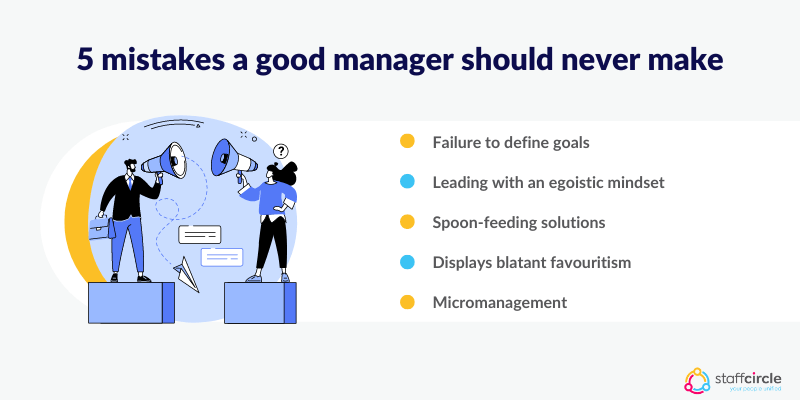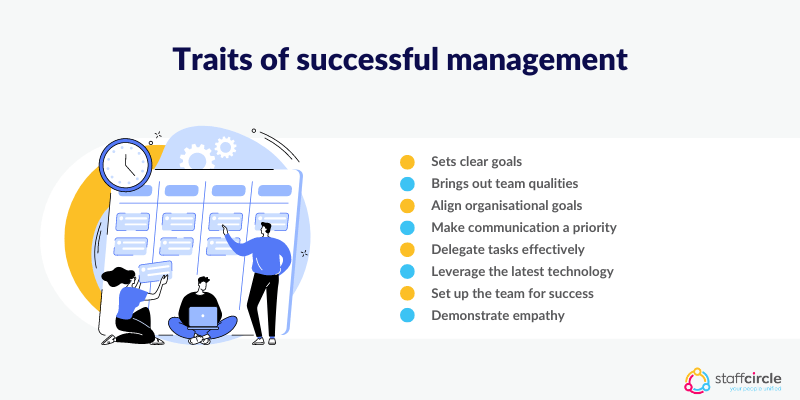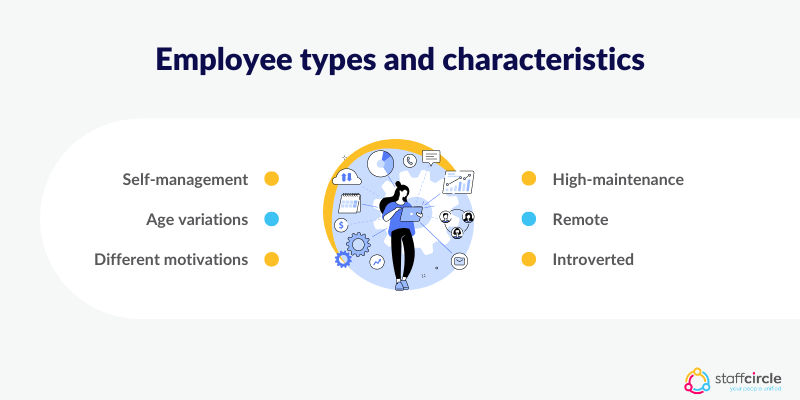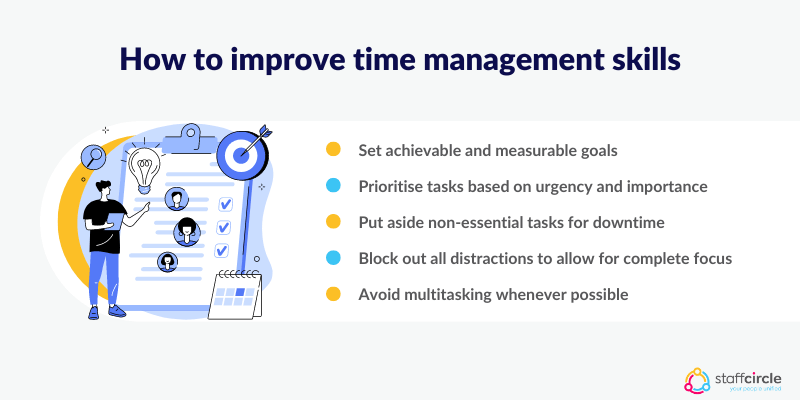How to be a good manager? The best managers drive businesses towards success by fostering the unique talents and abilities of employees.
They help strengthen productive relationships, build high-performing teams, and cultivate creative and empowered A-players.
In this guide, we’ll cover all the leadership skills you need to know about creating good managers who are capable of delivering optimal business outcomes.
What makes a good manager?
An effective manager can make the difference between the success or failure of individuals, teams, and departments. They can inspire and motivate employees to go the extra mile, transforming average performers into the company’s A-players.
When looking for a great manager, keep an eye out for these common traits and leadership skills:
- A commitment to honesty. Great managers are always upfront about telling the truth and are committed to delivering negative feedback with openness and transparency.
- The ability to be decisive. While it is great to have the luxury of time when making decisions, managers often have to act on short notice. Choose managers who can act decisively when under pressure.
- Strong communication skills. Great leaders communicate their ideas clearly and concisely. They also know how to adapt their communication style depending on who they are addressing.
- Demonstrates confidence and assertiveness. A good manager is one who people view as sure of themselves and the decisions they make.
- Shows empathy towards the problems faced by others. When employees are under excess pressure to perform, they need managers who can lead with empathy and provide them with the support they need to overcome challenges.
These and more great qualities expected from leadership will be explored further on in this guide to being a good manager.

5 mistakes a good manager should never make
There are some common managerial pitfalls every leader should be aware of so they can avoid making these mistakes themselves.
The five main mistakes good managers need to avoid include:
Failing to define goals
Goals and objectives are the foundation of every employee’s working day. Goals give a clear indication of expectations and an understanding of the workload at hand, so when they’re poorly defined it can result in a wide range of problems.
To avoid making this mistake as a manager, consider using objectives and key results (OKRs) software. This allows managers and employees to coordinate their goals both in terms of how they are defined and the timeline to deliver results.

Leading With an Egoistic Mindset
Perhaps one of the most frequently cited poor personality traits for bad managers is the presence of an overwhelming ego. Egoistic managers are often perceived as arrogant bullies incapable of listening to feedback or considering new ideas, with the result being a significantly reduced pool of opportunities for the company.
Spoon-feeding Solutions
Managers who spoon-feed solutions to problems frequently come across as patronising to staff. This approach implies a lack of faith in the abilities of their employees, rather than inspiring confidence by appreciating the unique skills each employee has to offer.
Displaying Blatant Favouritism
Displaying favouritism for specific employees over other members of their team or department, for instance, by withholding negative feedback for some but not others, is a highly unprofessional trait often found in poor managers. Prone to negative behaviours, including biased promotions and general nepotism, these managers have a negative long-term impact on an organisation and can quickly erode morale in the workforce.
Micromanagement
As with spoon-feeding solutions, micromanagement is another bad management trait that implies a lack of faith in the abilities of employees. Micromanagement removes any sense of agency from employees that would otherwise improve performance through higher levels of confidence.
Avoiding micromanagement is one of the fundamental people management skills every good manager should be aware of.
8 Traits Of Successful Management
An effective manager brings a wide range of valuable assets to an organisation. Let’s examine eight of these traits of successful management and related leadership skills in more detail.
They set clear goals and expectations
Employees deliver their best performance when they are clear as to what their goals and expectations are. Great managers are able to clearly articulate what goals an employee is working towards at a given moment, as well as the general expectations demanded by their role. This also means that time and resources for training and development can be directed in the right place, setting the employee up for future success in their career development.
They bring out the best in their people
Successful managers understand the importance of leading by example. They offer guidance and support, bringing out the best in the people they manage.
As the article from the Harvard Business Review discussing what great managers do points out:
“Most managers are aware that employees respond well to recognition. Great managers refine and extend this insight. They realize that each employee plays to a slightly different audience. To excel as a manager, you must be able to match the employee to the audience he values most.”
The article elaborates further on this point, saying:
“One employee’s audience might be his peers; the best way to praise him would be to stand him up in front of his coworkers and publicly celebrate his achievement. Another’s favorite audience might be you; the most powerful recognition would be a one-on-one conversation where you tell him quietly but vividly why he is such a valuable member of the team.”
They align organisational purpose with team goals
One of the core drivers of organisational success lies in consistent alignment between the company’s overall strategy and the goals assigned to teams. Great managers consistently work to ensure this alignment is present, working to enhance team performance while establishing goals that closely reflect organisational purpose and vision.

They make communication a priority
A breakdown in communication is a surefire way for goals to fail. To counter this potential problem, good managers make the most of multi-channel communications systems to deliver clear and consistent information to their employees.
They also make the most of regular one2one check-ins and other ongoing meetings with individuals and teams. These allow managers and individuals to adapt to new challenges as and when they arise, and discuss negative feedback, while also maintaining progress towards professional development goals.
They Delegate Tasks Effectively
Task delegation is a daily activity for managers, and great managers understand how skills are distributed among the workforce so they can delegate tasks to the right people. This means developing a clear understanding of how talent is distributed among individuals and teams so the right people for the job are allocated appropriate tasks.
They leverage the latest technology
There is a broad range of tools and applications managers can make the most of to be effective in their role. The best managers are attuned to new technological development that can help them to organise, monitor, and conduct feedback with a diverse selection of employees.
This can include performance management software that features HR administrative tools, which managers can use in collaboration with HR leaders. Such tools allow for in-depth analytics to spot working trends and take steps to improve performance across the board.
Additionally, the integration of pay stub automation streamlines payroll processes, ensuring that employees receive accurate and timely payments without the need for manual intervention. This not only reduces the administrative burden but also enhances employee satisfaction by providing transparent access to their earnings and deductions.
They set up the team for success
While managers need to understand how their employees function as individuals, they also need a clear understanding of team dynamics. By understanding the characteristics of high-performing teams, great managers help bring their individual skills into a collective context. In doing so, they set up the team for success.
They demonstrate empathy with their team members
Empathic managers are adept at getting to the heart of any issues in an employee’s personal lives affecting performance. When they demonstrate empathy with their team members, they show that their value to the organisation is appreciated. This means viewing team members as individuals with unique mental and physical health concerns and adapting their responses accordingly.
A new breed of managers: Project Oxygen
While many companies have their own unique approach to fostering great managers, Google’s Project Oxygen, launched back in 2009, offers insights into how the leading companies approach this challenge.
Their findings have impacted leadership development ever since, revolving around the need for a clear vision and strategy for the team, assisting employees with career development, and focusing on delivering results.
The article from the New York Times, Google’s Quest to Build a Better Boss, explains:
“What employees valued most were even-keeled bosses who made time for one-on-one meetings, who helped people puzzle through problems by asking questions, not dictating answers, and who took an interest in employees’ lives and careers.”
This can be assisted with the use of data and analytics reporting, such as the tools found in performance management software. Performance reviews, feedback surveys, and other reporting can all give business leaders a complete overview of the organisation, helping them to foster and train the best managers possible.
Managing different types of employees
Effective managers deal with each employee on a case-by-case basis. Everyone has their own unique personality traits, and great managers are those who adapt their managerial style depending on who they are dealing with.
Here are some insights into how great managers deal with different types of employees by creating a positive workplace culture that is adapted to various working styles:
High-maintenance employees
High-maintenance employees can be difficult to manage and require a lot more attention than the average employee. Yet at the same time, such individuals still bring value to the organisation, and therefore need to be effectively managed.
A great manager deals with high-maintenance employees with a range of strategies. They are capable of tailoring their attention to the individual and instilling self-awareness so these employees are less ego-driven. They also know when it’s time to take a firm stance and keep the employee grounded on the tasks at hand.

Remote employees
In the post-pandemic world, hybrid and remote working systems have been widely adopted. When dealing with remote employees, managers need to consider a variety of factors in order to drive strong performance and gather employee feedback.
In order to effectively manage remote employees, a range of tools and processes need to be used, including performance management software to effectively coordinate with employees on their goals. Managers can also use a selection of remote team-building activities to help strengthen bonds between employees who are working remotely.
Older employees
Managing older employees involves the same processes as any other type of employee. At the same time, they can bring a degree of experience with them not found in those who have only been in a role for a short period of time.
An article for Forbes magazine discussing the mistakes to avoid when engaging older employees points out:
“One of the biggest mistakes you can make as a manager (of any age) is to refuse to learn from your team. In fact, your older employees are one of the best resources you can use to adapt to your new position. They’ve been with the company (not to mention in the industry) for several years—which means they’re aware of what works and what doesn’t, they’ve seen almost every possible technical problem, and they know the company’s clientele better than anyone else.”
Shy and introverted employees
Communication in the workplace is key to success, but shy and introverted employees can sometimes make clear communication difficult. Great managers are savvy at recognising introversion and understand which methods can be used to draw out their feedback.
They are also good at creating welcoming environments where shy people are comfortable speaking out and voicing their opinions. At the same time, great managers keenly understand when introverts require some space to get their heads down and continue with their work.
A team with different motivation levels
All teams are comprised of individuals with their own unique skills and levels of experience. Good management means understanding not only the individual skillset and levels of motivation but how these manifest at the team level.
This requires good managers to delegate appropriately so that individual members of the team are working to their strengths. It also requires good judgment when pairing or grouping members of a team for specific tasks, creating sub-teams that build on the collective strengths of their members.
Self-management employees
Finally, effective managers need the appropriate skills for dealing with self-management-oriented employees. These employees work best when left to their own devices, and are perhaps the most negatively affected by leaders who engage in micromanagement.
Great managers give employees with this personality type as much freedom and autonomy as their goals allow for. Provided expectations are clear, such employees are often the company’s A-players or those great at taking a single-minded approach to completing tasks and problem-solving.
How do you become a good manager?
Managers have plenty of options when it comes to training and developing the skills required for their role. There are also some core rules of thumb worth considering which every manager should be aware of, working to develop them as part of a continual process.
These include the following skills:
Learn to delegate
Managers can’t do everything themselves, and delegation is an important part of distributing tasks among those who are best equipped to handle them. Managers can take advantage of departmental and organisational charts to see where talent lies in the workforce. This allows them to delegate in ways that empower teams, built trust, and help with the professional development of employees.
Plan ahead
The best managers work through scenarios so that potential problems can be headed off at the pass. Managers should work on their time management and planning skills at all times so employees are equipped with the necessary tools to deal with a crisis.

Effective time management can be improved by:
- Setting achievable and measurable goals.
- Prioritising tasks based on urgency and importance.
- Putting aside non-essential tasks for downtime.
- Blocking out all distractions to allow for complete focus.
- Avoiding multitasking whenever possible.
Ask for guidance
The worst managers are those who assume they know everything and therefore don’t need to ask others for guidance. In contrast, the best managers know that others can teach them valuable lessons, offering insights into management they might otherwise miss.
Asking for guidance can range from shadowing the manager being replaced before taking on the role to working with coaches and mentors to enhance existing management skills. It can also mean going on management courses, or reading management books that cover the best practices for getting the most out of individuals and teams.
How to use video when leading a team meeting
With remote working on the rise, managers have had to adapt their leadership style to suit the increased use of communications technology. One of the biggest challenges faced comes with dealing with team meetings while using video conferencing technology. Many of the advantages to face-to-face team meetings are lost when everyone is restrained by video conferencing software.
When conducting a team meeting via video, consider the following tips.
- Establish a clear agenda before the meetings so participants understand what topics to prepare for;
- Only request attendance from essential members of staff to ensure the meeting remains focused;
- Try to keep the meeting short and to the point;
- Avoid lecturing in the meeting, and give staff plenty of time to voice their opinions;
- Take advantage of the medium and share images, documents, and other presentations as part of the meeting
How to hire great managers
Hiring great managers requires a holistic understanding of the various qualities and attributes that helps them transcend in their role. In the words of a report from Deloitte, this means understanding the “DNA” of leadership potential, and the various skills and competencies this incorporates.
Deloitte uses a Leadership Capability Model that assesses leadership potential across a series of metrics. These metrics explore developable capabilities such as inspirational leadership, execution, influence, and competitive edge.
They also delve into aspects of leadership potential that include change and intellectual potential, as well as the candidate’s potential to motivate and inspire the people around them. A broad range of general leadership capabilities is also factored into their analysis.
While other organisations use different models when hiring great managers, the general rule of thumb remains the same throughout. Business leaders and HR professionals need a clear-eyed view of the various management qualities outlined in this article so that they are best prepared to identify candidates who best embody these traits.
Final thoughts
Being a good manager confers a long list of advantages on a company, from vastly improved performance to creating a workforce with high levels of engagement and motivation.
This article should help managers to develop and fine-tune the essential skills all great leaders need. It will also help great leaders adapt to the changing demands of the individuals and teams they are responsible for.





